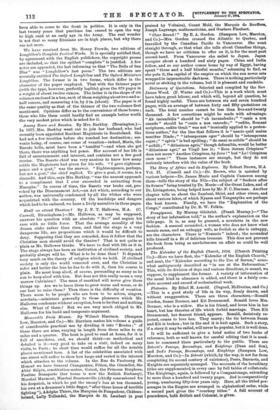travelled by the Canadian Pacific to Vancouver. She went straight
through, so that what she tells about Canadian things, though we have no criticism to offer on it, is for the most part second-hand. From Vancouver she sailed to Japan. Japan occupies about a hundred and sixty pages. China and India follow, and so our author comes home by way of Egypt, having spent " three and a half blissful months," returning to find, as she puts it, the capital of the empire on which the sun never sets wrapped in impenetrable darkness. There is nothing particularly novel or striking in the volume, but it is pleasant and readable. Dictionary of Quotations. Selected and compiled by the Rev James Wood. (F. Warne and Co.)—This is a work which must have taken great labour, and which will, beyond all question, be found highly useful. There are between six and seven hundred pages, with an average of between forty and fifty quotations on each. The total number cannot be less than five-and-twenty thousand. A few corrections might be made with advantage. " Ab incunibilis " should be " ab incunabulis ; " "cans a non eanedo " should be "cans a non canendo;" "cedite, Romani scriptores, cedite'Graii " was not "ironically applied to a preten- tious author," for the line that follows it is " nescio quid mains nascitur Iliade ; " " intemperans ager" should be "intemperans aeger ;" " sylvis" is bad spelling; " de omni re scibile " should be " seibili ; " " ditissimus agris," though defensible, would be better " ditissimus agri," as Virgil has it; " Ecce iterum Crispinus" does not mean " Another Crispinus, by Jove !" but "Lo ! Crispinus once more !" These instances are enough, but they do not seriously interfere with the value of the book.


















































 Previous page
Previous page